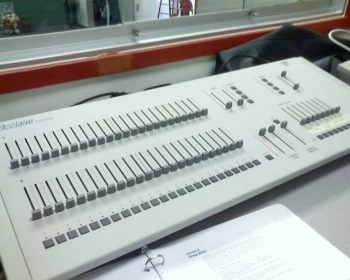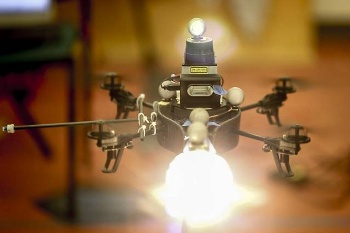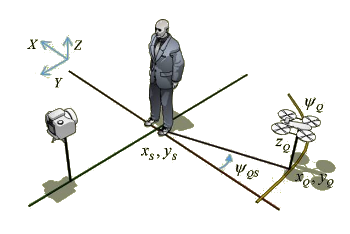Gaffer Drone
August 8, 2014
I'm one of the few people who actually reads the
credits at the end of a
movie or
television show. Actually, I should write that I
try to read the credits, since they usually
scroll or flash very fast. In the industry, scrolling credits are called "the crawl." It's there that you find such colorful characters as "
best boy" and "
gaffer."
A gaffer is the chief
electrician on a film or television crew. As such, he's responsible for the
lighting. A best boy is his assistant, and his role is to manage the lighting crew. The
etymology for "best boy" comes from the expression for a
master's most experienced
apprentice.
Proper lighting is essential to
still photography as well as film making. It's easy to distinguish by the lighting whether a particular photograph on the
Internet was shot by a
professional, rather than an
amateur. In my own photography, one thing that I check when posing people outdoors is patchy lighting. People posed under
trees can have patches of light on their
faces that ruin an otherwise good photo.

High-tech lighting.
The control console of a computerized theater lighting system, manufactured by Electronic Theatre Controls.
(Via Wikimedia Commons.)
A big part of lighting is placing the lights in the right place, and that's the reason why there are so many names listed on a
video production crawl. A team of
computer scientists from
MIT and
Cornell University has updated the gaffer's
craft by using
spotlight-equipped
autonomous drones for photographic lighting.[1-3]
These drones sense the positioning of the
photographer and his
subject to position themselves at the ideal lighting location for an effect called
rim lighting. In rim lighting, the
edge of the subject is strongly illuminated. The results of the MIT-Cornell study will be presented at the
International Symposium on Computational Aesthetics in Graphics, Visualization, and Imaging, which will run from August 8-10, 2014, in
Vancouver,
Canada. This
conference is collocated with the
ACM-
sponsored SIGGRAPH 2014.
The
research team chose rim lighting for their
experiments because it's a difficult lighting effect. Says
Manohar Srikanth, a former MIT
post-doc who is now at
Nokia Advanced Technologies,
Sunnyvale, California,
"It's very sensitive to the position of the light... If you move the light, say, by a foot, your appearance changes dramatically."[2]
Even with today's
energy efficient LED lighting technology, it would be difficult to do this with a drone
battery pack, so the experimental drone was
tethered. In operation, the photographer inputs the direction from which the light should come and the width of the light rim.[2] A
computer algorithm analyzes the image in the photographer's
camera and it commands the drone to position itself to maintain the proper rim lighting effect.[1] Says Srikanth,
"If somebody is facing you, the rim you would see is on the edge of the shoulder, but if the subject turns sideways, so that he's looking 90 degrees away from you, then he's exposing his chest to the light, which means that you'll see a much thicker rim light... So in order to compensate for the change in the body, the light has to change its position quite dramatically."[2]

The "gaffer" drone is a robot helicopter equipped with a continuous light source, a photographic flash, and a laser rangefinder.
(MIT image from study authors.)
The drone
computes its required position twenty times each second. The researchers tried a complex algorithm which analyzed the
silhouette of the subject, but that proved to be too slow. Instead, it looks at most dramatic change in
light intensity in the image, and it measures its width. The drone uses
LIDAR for rangefinding.[2]
Although the experiments were facilitated by their being done in a
laboratory equipped with
cameras that allowed a determination of the drone position for use in the algorithm, there's no reason why accurate enough position sensors couldn't be incorporated into the drone, itself.[2]

The drone positioning algorithm for the rim lighting experiment used simple geometry.
(MIT image from study authors.)
These experiments were done indoors, but there's been a lot of interesting drone photography done outdoors.
Realtors have used drones to obtain aerial footage of their listed properties, which is a public example of how useful drones can be. The
US Federal Aviation Administration (FAA), in a controversial ruling, has told realtors that they must stop this practice.[4]
The most public example of a possible
commercial use of drones is
Amazon's proposed drone
package delivery service, but that's also been prohibited by the FAA.[5] Amazon has asked the FAA for an exemption for its
Prime Air package delivery service.[6]
Presently, the FAA has expressly forbidden, among others, the following commercial uses of drones:[5]
• Determining whether crops need to be watered.
• Photographing an event.
• Photographing a property as a sales aid.
• Demonstrating drone aerobatics at a paid exhibition.
References:
- Manohar Srikanth, Kavita Bala and Fredo Durand, "Computational Rim Illumination with Aerial Robots," Paper prepared for the International Symposium on Computational Aesthetics in Graphics, Visualization, and Imaging, August 8-10, 2014, Vancouver, Canada.
- Larry Hardesty, "Drone lighting," MIT Press Release, July 11, 2014.
- Manohar Srikanth, Fredo Durand and Kavita Bala, "Computational Rim Illumination with Aerial Robots," YouTube Video, July 11, 2014.
- Gregory S. McNeal, "FAA Intimidates Coldwell Banker And Other Realtors Into Shunning Drone Photography," Forbes, July 11, 2014.
- David Kravets, "FAA grounds Amazon's drone delivery plans," Ars Technica, June 24, 2014.
- John Ribeiro, "Amazon seeks US exemption to test delivery drones," Computerworld, July 11, 2014.
- Federal Aviation Administration, "Interpretation of the Special Rule for Model Aircraft (14 CFR Part 91)." PDF File.
Permanent Link to this article
Linked Keywords: Closing credits; film; movie; television program; television show; scrolling; best boy; gaffer; electrician; stage lighting; etymology; master craftsman; apprenticeship; apprentice; still photography; Internet; professional; amateur; tree; face; high-tech; lighting; lighting control console; computerized; theater lighting; system; manufacturing; manufacture; Electronic Theatre Controls; Wikimedia Commons; video production; computer scientist; Massachusetts Institute of Technology; MIT; Cornell University; craft; spotlight; autonomous; unmanned aerial vehicle; drone; photographer; model; subject; rim lighting; edge; International Symposium on Computational Aesthetics in Graphics, Visualization, and Imaging; Vancouver; Canada; academic conference; Association for Computing Machinery; ACM; sponsor; SIGGRAPH 2014; research; experiment; Manohar Srikanth; postdoctoral research; post-doc; Nokia Advanced Technologies; Sunnyvale, California; energy conversion efficiency; energy efficient; LED lighting technology; battery pack; tether; tethered; computer algorithm; image analysis; digital camera; robot; helicopter; photographic flash; laser rangefinder; computation; compute; silhouette; photometry; light intensity; LIDAR; laboratory; geometry; real estate broker; realtor; US Federal Aviation Administration; commercial; Amazon; package delivery service; Prime Air; crop; irrigation; radio-controlled aerobatics; exhibition.